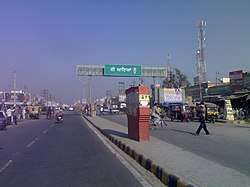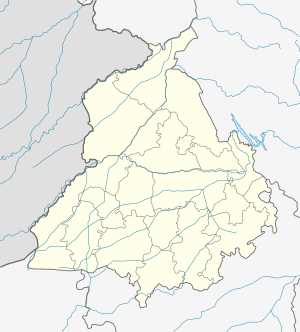Malout
Malout is a town in the Muktsar district of the Indian state of Punjab. It is in the southern Punjab "cotton belt", where production per kilometer is one of the highest in India. Malout is on NH-354 and NH-9 and NH-7, which connects Fazilka to Mana. The boundaries of Haryana and Rajasthan are 30 kilometres (19 mi) and 65 kilometres (40 mi), respectively, from the town. Malout is 55 kilometres (34 mi) from the border with Pakistan, and has been affected by military incidents.
Malout | |
|---|---|
Town | |
 National Highway 9 in Malout | |
 Malout Location in Punjab, India | |
| Coordinates: 30.190°N 74.499°E | |
| Country | India |
| State | Punjab |
| District | Muktsar |
| Population (2011) | |
| • Total | 81,406 |
| Languages | |
| • Official | Punjabi |
| Time zone | UTC+5:30 (IST) |
| PIN | 152107[1] |
| Telephone code | 1637 |
| Vehicle registration | PB-53 |
History
Shiv Singh Johiya (959 AD) was ruler of Kot Malot (Muktsar) (Punjab). He was attacked by Yavanas in 959 AD and lost his kingdom. He along with 12 sons moved from Kot Malot (Malout) (Muktsar) (Punjab) to Sidhmukh in Rajasthan. Khemraj was eldest son of Raja Shiv Singh (959 AD),and 12 th son was malaji who is said to have given name to Mechu Clan of Jats. Malout was founded 400–500 years ago, and the origin of its name is uncertain. In 1917, the British government established the Bathinda–Karachi railway line; the Malout railway station was built the following year. The town was incorporated on 19 March 1920. A seven-member committee purchased land, which was divided into shopping and residential areas.
On 17 November 1921, Firozpur district commissioner J. C. Koldsitrimiu established a water-storage and -purification tank system in Malout. Edward, Prince of Wales, visited the region that day and the system was named in his honour.
Malout began growing, and the town had a post office, telephone exchange, guest house and cemetery by the end of 1940. With cotton producers and the agricultural machinery industry, Malout and its nearby villages were known as the cotton capital of Punjab.[2]
Commerce and industry
Malout is known for its agricultural-equipment manufacturing industry. Agricultural equipment made in the town is sold throughout Punjab and the rest of India. Other major industries in the region are cotton cultivation and apparel manufacturing; the clothing business in Malout dates back several centuries. A substantial market exists for used cars and motorcycles.
Climate
The region's temperature varies widely by season. Summer temperatures reach 48–50 °C (118–122 °F), and winter temperatures fall to 1–2 °C (34–36 °F). The western Himalayas in the north and the Thar Desert in the south and southwest primarily determine the climate. The south-western monsoon brings nearly 70 percent of the annual rainfall from July to September. Most of the district has an arid (tropic) moisture regime, according to soil-classification criteria. Soil-moisture computations using the Newhall mathematical model indicate that the region has a "weak aridic" moisture regime (Van Wambeke, 1985).
Education
Malout Institute of Management and Information Technology is a government engineering college, and Guru Teg Bahadur Khalsa Institute of Engineering and Technology is a private college. The town has government senior secondary schools for boys and girls, and a number of English-language private schools. D. A. V. Edward Ganj Senior Secondary Public School is one of Malout's oldest schools. Guru Tegh Bahadur Khalsa Senior Secondary School and S. D. Senior Secondary School are the oldest private schools, and Sacred Heart Convent School offers an ICSE curriculum. The D.A.V. College Managing Committee offers graduate and post-graduate courses.
Political representation
Ajaib Singh Bhatti, MLA of Malout Assembly Constituency, was elected in 2017. His predecessor was S. Harptreet Singh Kotbhai.
Notable residents
- Rohit Bansal, chief executive officer and co-founder of Snapdeal
- Simranjot Singh Makkar, Daily Post Punjabi Special Correspondent Journalist
References
- "Malout Muktsar Pin Code". Citypincode.in. Retrieved 6 September 2019.
- "Maloutonline". Retrieved 6 September 2019.
- Mookerji, Nivedita (5 August 2014). "Flipkart CEO wanted to be a gamer, Snapdeal chief a food and film critic". Business Standard. Archived from the original on 16 April 2019. Retrieved 6 September 2019.